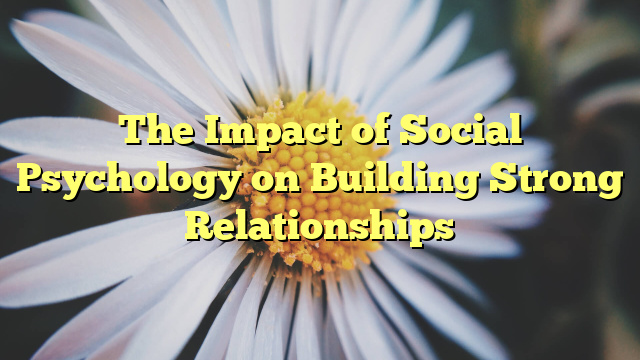The Impact of Social Psychology on Building Strong Relationships
The Impact of Social Psychology on Building Strong Relationships
Introduction
Social psychology plays a crucial role in understanding and building strong relationships. It explores how individuals perceive, influence, and relate to others, providing valuable insights into human behavior and interaction. By applying social psychology principles, individuals can enhance their communication skills, develop empathy, and foster healthy connections with others. This article delves into the impact of social psychology on building strong relationships, highlighting key concepts and strategies.
The Power of Perception
Perception plays a significant role in how individuals form and maintain relationships. Social psychology emphasizes the importance of understanding how people perceive themselves and others. By recognizing and appreciating individual differences, individuals can build stronger connections based on empathy and acceptance.
One key concept in social psychology is the fundamental attribution error. This refers to the tendency to attribute others’ behavior to internal characteristics rather than external factors. By being aware of this bias, individuals can avoid making hasty judgments and instead focus on understanding the context and circumstances that influence others’ actions.
Effective Communication
Effective communication is essential for building strong relationships. Social psychology provides valuable insights into the dynamics of communication and offers strategies for improving interpersonal interactions.
Active listening is a fundamental skill emphasized in social psychology. By actively listening to others, individuals can demonstrate empathy, validate their feelings, and foster a sense of understanding. This involves giving one’s full attention, maintaining eye contact, and providing verbal and non-verbal cues to show engagement.
Another important aspect of effective communication is non-verbal communication. Social psychology highlights the significance of body language, facial expressions, and gestures in conveying messages. By being aware of one’s non-verbal cues and interpreting others’ signals accurately, individuals can enhance their communication skills and build stronger connections.
Empathy and Perspective-Taking
Empathy is a crucial component of building strong relationships. Social psychology emphasizes the importance of understanding and sharing others’ emotions, fostering a sense of connection and support.
Perspective-taking is a key strategy promoted in social psychology to develop empathy. This involves putting oneself in another person’s shoes and trying to understand their thoughts, feelings, and experiences. By practicing perspective-taking, individuals can develop a deeper understanding of others’ perspectives and build stronger relationships based on empathy and compassion.
Building Trust and Cooperation
Trust and cooperation are vital for building strong relationships. Social psychology provides insights into the factors that contribute to trust and cooperation, offering strategies to enhance these elements.
One important concept in social psychology is the reciprocity norm. This norm suggests that individuals are more likely to trust and cooperate with others who reciprocate their actions. By demonstrating kindness, generosity, and fairness, individuals can foster trust and cooperation in their relationships.
Another key concept is the mere exposure effect. This refers to the tendency to develop a preference for things or people that are familiar. By spending time together and engaging in shared activities, individuals can increase familiarity and strengthen their relationships.
Conflict Resolution
Conflict is inevitable in any relationship, but social psychology offers strategies for resolving conflicts effectively and maintaining strong relationships.
One important strategy is active listening, as mentioned earlier. By actively listening to each other’s perspectives and concerns, individuals can find common ground and work towards a mutually beneficial solution.
Another strategy is the use of collaborative problem-solving. Social psychology emphasizes the importance of working together to find solutions that satisfy both parties’ needs. By approaching conflicts with a cooperative mindset, individuals can build stronger relationships based on mutual understanding and compromise.
Conclusion
Social psychology has a profound impact on building strong relationships. By understanding perception, practicing effective communication, developing empathy, fostering trust and cooperation, and resolving conflicts, individuals can enhance their relationship-building skills. Applying social psychology principles can lead to healthier, more fulfilling connections with others, ultimately contributing to personal happiness and well-being.

